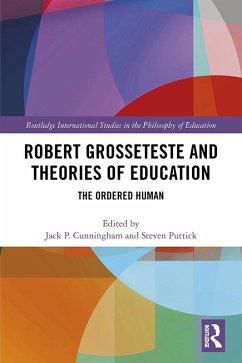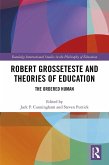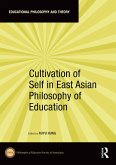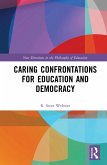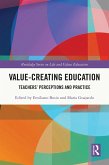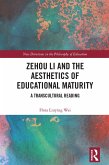Robert Grosseteste and Theories of Education (eBook, ePUB)
The Ordered Human
Redaktion: Cunningham, Jack P.; Puttick, Steven
40,95 €
40,95 €
inkl. MwSt.
Sofort per Download lieferbar

20 °P sammeln
40,95 €
Als Download kaufen

40,95 €
inkl. MwSt.
Sofort per Download lieferbar

20 °P sammeln
Jetzt verschenken
Alle Infos zum eBook verschenken
40,95 €
inkl. MwSt.
Sofort per Download lieferbar
Alle Infos zum eBook verschenken

20 °P sammeln
Robert Grosseteste and Theories of Education (eBook, ePUB)
The Ordered Human
Redaktion: Cunningham, Jack P.; Puttick, Steven
- Format: ePub
- Merkliste
- Auf die Merkliste
- Bewerten Bewerten
- Teilen
- Produkt teilen
- Produkterinnerung
- Produkterinnerung

Bitte loggen Sie sich zunächst in Ihr Kundenkonto ein oder registrieren Sie sich bei
bücher.de, um das eBook-Abo tolino select nutzen zu können.
Hier können Sie sich einloggen
Hier können Sie sich einloggen
Sie sind bereits eingeloggt. Klicken Sie auf 2. tolino select Abo, um fortzufahren.

Bitte loggen Sie sich zunächst in Ihr Kundenkonto ein oder registrieren Sie sich bei bücher.de, um das eBook-Abo tolino select nutzen zu können.
It examines Robert Grosseteste's often underrepresented ideas on education. It uniquely brings together academics from the fields of medieval history, modern science and contemporary education to shed new light on a fascinating medieval figure whose work has an enormous amount to offer anyone with an interest in our educational processes.
- Geräte: eReader
- mit Kopierschutz
- eBook Hilfe
Andere Kunden interessierten sich auch für
![Robert Grosseteste and Theories of Education (eBook, PDF) Robert Grosseteste and Theories of Education (eBook, PDF)]() Robert Grosseteste and Theories of Education (eBook, PDF)40,95 €
Robert Grosseteste and Theories of Education (eBook, PDF)40,95 €![A Kaleidoscopic View of Chinese Philosophy of Education (eBook, ePUB) A Kaleidoscopic View of Chinese Philosophy of Education (eBook, ePUB)]() A Kaleidoscopic View of Chinese Philosophy of Education (eBook, ePUB)40,95 €
A Kaleidoscopic View of Chinese Philosophy of Education (eBook, ePUB)40,95 €![Cultivation of Self in East Asian Philosophy of Education (eBook, ePUB) Cultivation of Self in East Asian Philosophy of Education (eBook, ePUB)]() Cultivation of Self in East Asian Philosophy of Education (eBook, ePUB)40,95 €
Cultivation of Self in East Asian Philosophy of Education (eBook, ePUB)40,95 €![Caring Confrontations for Education and Democracy (eBook, ePUB) Caring Confrontations for Education and Democracy (eBook, ePUB)]() R. Scott WebsterCaring Confrontations for Education and Democracy (eBook, ePUB)42,95 €
R. Scott WebsterCaring Confrontations for Education and Democracy (eBook, ePUB)42,95 €![Value-Creating Education (eBook, ePUB) Value-Creating Education (eBook, ePUB)]() Value-Creating Education (eBook, ePUB)42,95 €
Value-Creating Education (eBook, ePUB)42,95 €![Zehou Li and the Aesthetics of Educational Maturity (eBook, ePUB) Zehou Li and the Aesthetics of Educational Maturity (eBook, ePUB)]() Flora Liuying WeiZehou Li and the Aesthetics of Educational Maturity (eBook, ePUB)42,95 €
Flora Liuying WeiZehou Li and the Aesthetics of Educational Maturity (eBook, ePUB)42,95 €![Education, Nihilism, and Survival (eBook, ePUB) Education, Nihilism, and Survival (eBook, ePUB)]() Ernest KrauszEducation, Nihilism, and Survival (eBook, ePUB)45,95 €
Ernest KrauszEducation, Nihilism, and Survival (eBook, ePUB)45,95 €-
-
-
It examines Robert Grosseteste's often underrepresented ideas on education. It uniquely brings together academics from the fields of medieval history, modern science and contemporary education to shed new light on a fascinating medieval figure whose work has an enormous amount to offer anyone with an interest in our educational processes.
Dieser Download kann aus rechtlichen Gründen nur mit Rechnungsadresse in A, B, BG, CY, CZ, D, DK, EW, E, FIN, F, GR, HR, H, IRL, I, LT, L, LR, M, NL, PL, P, R, S, SLO, SK ausgeliefert werden.
Produktdetails
- Produktdetails
- Verlag: Taylor & Francis eBooks
- Seitenzahl: 286
- Erscheinungstermin: 6. Dezember 2019
- Englisch
- ISBN-13: 9781000761313
- Artikelnr.: 58392574
- Verlag: Taylor & Francis eBooks
- Seitenzahl: 286
- Erscheinungstermin: 6. Dezember 2019
- Englisch
- ISBN-13: 9781000761313
- Artikelnr.: 58392574
- Herstellerkennzeichnung Die Herstellerinformationen sind derzeit nicht verfügbar.
Jack P. Cunningham is Reader in Ecclesiastical History and Programme Leader for Theology at Bishop Grosseteste University, Lincoln, UK. Steven Puttick is Associate Professor of Teacher Education and Fellow of St Anne's College, Oxford, UK.
Preface
Richard Pring. Emeritus Prof of Education, Oxford University.
Introductory Chapter. Robert Grosseteste and the educational renaissance in
Twelfth and thirteenth century Western Europe.
Jack P. Cunningham.
Section One: Robert Grosseteste and the Medieval Ordered Human.
Chapter 1. Deification as the goal of human order according to Robert
Grosseteste. Gioacchino Curiello.
Chapter 2. Robert Grosseteste on Eudaimonia, Happiness, and Learning: Why
the Nicomachean Ethics may be useful. Rosamund Gammie.
Chapter 3. Robert Grosseteste and the Theory of Learning: The Ordered
Human, Robert Grosseteste and Poetry. Charles Roe.
Chapter 4. 'Gentleness and Discretion': Medieval Perspectives on Childhood
Learning and Guiding Adult Education. Giles E. M. Gasper and Michael E. M.
Gasper.
Section Two: Modern Education through the Grossetestian Lens.
Chapter 5. Knowledge and Virtue: re-ordering humans in Robert Grosseteste's
Philosophy of Education. Steven Puttick.
Chapter 6. The legacy of Robert Grosseteste and the Teaching of
experimental Physics to 14-16 years olds in England. Brian Tanner and
Robert Tanner.
Chapter 7. The Human Ordering of the Arts and Science. Tom McLeish.
Chapter 8. The contested call for 'what works' education research: the
Nature of contemporary education research discourses and Grosseteste's
views on the anima mundi. Adam Hounslow-Eyre.
Chapter 9. Rejecting the Market-Place: Using the Past to Inspire Access to
University Education. Peter Claus and Giles E. M. Gasper.
Section Three. Grossetestian Theories of Learning and Pedagogy.
Chapter 10. Children as natural philosophers. A perspective upon the
enhancement of children's confidence through the Philosophical spectacles
of Grosseteste and Gadamer. Roger Wood.
Chapter 11. How does Social Constructivism as displayed in contemporary
educational settings compare with the Grossetestian view of the development
of human Knowledge? Smaragda Kampouri, Nick Gee, Elaine Howell and Ami
Montgomery.
Chapter 12. Robert Grosseteste, a proto-Constructivist? Abigail Dorr and
Sacha Mason.
Chapter 13. Robert Grosseteste's illumination theory and Jack Mezirow's
Transformative Learning: an educational Appraisal. Karl Aubrey.
Richard Pring. Emeritus Prof of Education, Oxford University.
Introductory Chapter. Robert Grosseteste and the educational renaissance in
Twelfth and thirteenth century Western Europe.
Jack P. Cunningham.
Section One: Robert Grosseteste and the Medieval Ordered Human.
Chapter 1. Deification as the goal of human order according to Robert
Grosseteste. Gioacchino Curiello.
Chapter 2. Robert Grosseteste on Eudaimonia, Happiness, and Learning: Why
the Nicomachean Ethics may be useful. Rosamund Gammie.
Chapter 3. Robert Grosseteste and the Theory of Learning: The Ordered
Human, Robert Grosseteste and Poetry. Charles Roe.
Chapter 4. 'Gentleness and Discretion': Medieval Perspectives on Childhood
Learning and Guiding Adult Education. Giles E. M. Gasper and Michael E. M.
Gasper.
Section Two: Modern Education through the Grossetestian Lens.
Chapter 5. Knowledge and Virtue: re-ordering humans in Robert Grosseteste's
Philosophy of Education. Steven Puttick.
Chapter 6. The legacy of Robert Grosseteste and the Teaching of
experimental Physics to 14-16 years olds in England. Brian Tanner and
Robert Tanner.
Chapter 7. The Human Ordering of the Arts and Science. Tom McLeish.
Chapter 8. The contested call for 'what works' education research: the
Nature of contemporary education research discourses and Grosseteste's
views on the anima mundi. Adam Hounslow-Eyre.
Chapter 9. Rejecting the Market-Place: Using the Past to Inspire Access to
University Education. Peter Claus and Giles E. M. Gasper.
Section Three. Grossetestian Theories of Learning and Pedagogy.
Chapter 10. Children as natural philosophers. A perspective upon the
enhancement of children's confidence through the Philosophical spectacles
of Grosseteste and Gadamer. Roger Wood.
Chapter 11. How does Social Constructivism as displayed in contemporary
educational settings compare with the Grossetestian view of the development
of human Knowledge? Smaragda Kampouri, Nick Gee, Elaine Howell and Ami
Montgomery.
Chapter 12. Robert Grosseteste, a proto-Constructivist? Abigail Dorr and
Sacha Mason.
Chapter 13. Robert Grosseteste's illumination theory and Jack Mezirow's
Transformative Learning: an educational Appraisal. Karl Aubrey.
Preface
Richard Pring. Emeritus Prof of Education, Oxford University.
Introductory Chapter. Robert Grosseteste and the educational renaissance in
Twelfth and thirteenth century Western Europe.
Jack P. Cunningham.
Section One: Robert Grosseteste and the Medieval Ordered Human.
Chapter 1. Deification as the goal of human order according to Robert
Grosseteste. Gioacchino Curiello.
Chapter 2. Robert Grosseteste on Eudaimonia, Happiness, and Learning: Why
the Nicomachean Ethics may be useful. Rosamund Gammie.
Chapter 3. Robert Grosseteste and the Theory of Learning: The Ordered
Human, Robert Grosseteste and Poetry. Charles Roe.
Chapter 4. 'Gentleness and Discretion': Medieval Perspectives on Childhood
Learning and Guiding Adult Education. Giles E. M. Gasper and Michael E. M.
Gasper.
Section Two: Modern Education through the Grossetestian Lens.
Chapter 5. Knowledge and Virtue: re-ordering humans in Robert Grosseteste's
Philosophy of Education. Steven Puttick.
Chapter 6. The legacy of Robert Grosseteste and the Teaching of
experimental Physics to 14-16 years olds in England. Brian Tanner and
Robert Tanner.
Chapter 7. The Human Ordering of the Arts and Science. Tom McLeish.
Chapter 8. The contested call for 'what works' education research: the
Nature of contemporary education research discourses and Grosseteste's
views on the anima mundi. Adam Hounslow-Eyre.
Chapter 9. Rejecting the Market-Place: Using the Past to Inspire Access to
University Education. Peter Claus and Giles E. M. Gasper.
Section Three. Grossetestian Theories of Learning and Pedagogy.
Chapter 10. Children as natural philosophers. A perspective upon the
enhancement of children's confidence through the Philosophical spectacles
of Grosseteste and Gadamer. Roger Wood.
Chapter 11. How does Social Constructivism as displayed in contemporary
educational settings compare with the Grossetestian view of the development
of human Knowledge? Smaragda Kampouri, Nick Gee, Elaine Howell and Ami
Montgomery.
Chapter 12. Robert Grosseteste, a proto-Constructivist? Abigail Dorr and
Sacha Mason.
Chapter 13. Robert Grosseteste's illumination theory and Jack Mezirow's
Transformative Learning: an educational Appraisal. Karl Aubrey.
Richard Pring. Emeritus Prof of Education, Oxford University.
Introductory Chapter. Robert Grosseteste and the educational renaissance in
Twelfth and thirteenth century Western Europe.
Jack P. Cunningham.
Section One: Robert Grosseteste and the Medieval Ordered Human.
Chapter 1. Deification as the goal of human order according to Robert
Grosseteste. Gioacchino Curiello.
Chapter 2. Robert Grosseteste on Eudaimonia, Happiness, and Learning: Why
the Nicomachean Ethics may be useful. Rosamund Gammie.
Chapter 3. Robert Grosseteste and the Theory of Learning: The Ordered
Human, Robert Grosseteste and Poetry. Charles Roe.
Chapter 4. 'Gentleness and Discretion': Medieval Perspectives on Childhood
Learning and Guiding Adult Education. Giles E. M. Gasper and Michael E. M.
Gasper.
Section Two: Modern Education through the Grossetestian Lens.
Chapter 5. Knowledge and Virtue: re-ordering humans in Robert Grosseteste's
Philosophy of Education. Steven Puttick.
Chapter 6. The legacy of Robert Grosseteste and the Teaching of
experimental Physics to 14-16 years olds in England. Brian Tanner and
Robert Tanner.
Chapter 7. The Human Ordering of the Arts and Science. Tom McLeish.
Chapter 8. The contested call for 'what works' education research: the
Nature of contemporary education research discourses and Grosseteste's
views on the anima mundi. Adam Hounslow-Eyre.
Chapter 9. Rejecting the Market-Place: Using the Past to Inspire Access to
University Education. Peter Claus and Giles E. M. Gasper.
Section Three. Grossetestian Theories of Learning and Pedagogy.
Chapter 10. Children as natural philosophers. A perspective upon the
enhancement of children's confidence through the Philosophical spectacles
of Grosseteste and Gadamer. Roger Wood.
Chapter 11. How does Social Constructivism as displayed in contemporary
educational settings compare with the Grossetestian view of the development
of human Knowledge? Smaragda Kampouri, Nick Gee, Elaine Howell and Ami
Montgomery.
Chapter 12. Robert Grosseteste, a proto-Constructivist? Abigail Dorr and
Sacha Mason.
Chapter 13. Robert Grosseteste's illumination theory and Jack Mezirow's
Transformative Learning: an educational Appraisal. Karl Aubrey.
